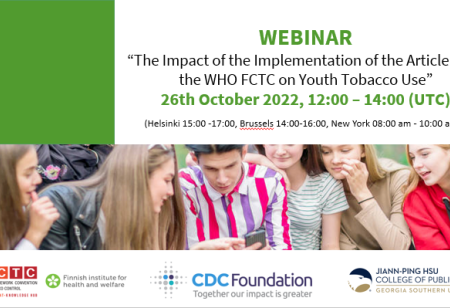
New research project addresses the implementation of tobacco advertising bans and youth tobacco use - 2 March 2022

New research project addresses the implementation of tobacco advertising bans and youth tobacco use
The aim of this project is to examine the association between the comprehensiveness of the implementation of the Article 13 (Tobacco advertising, promotion and sponsorship, TAPS) of the World Health Organization Framework Convention on Tobacco Control (WHO FCTC) and youth tobacco and e-cigarette use prevalence, trends, and correlates.
The policies under the Article 13 have been selected as the key focus of the project given the relatively low levels of implementation of this Article based on the WHO FCTC Global Progress Reports, and the importance of prevention of youth exposure to TAPS. The project will focus on cross-country comparisons using data from the Global Youth Tobacco Survey (GYTS) linked with the WHO FCTC implementation data. Other preventive measures under the key provisions of the WHO FCTC will also be included to indicate the general strength of tobacco control in the study countries.
The project will be executed via a new collaborative research partnership between the WHO FCTC Knowledge Hub on Tobacco Surveillance, hosted by the Finnish Institute for Health and Welfare (THL), the Jiann-Ping Hsu College of Public Health (JPHCOPH) Georgia Southern University. The project is funded by the CDC Foundation.
The researchers from THL and JPHCOPH are expected to complete their project with the CDC Foundation and CDC by 31 December 2022 to inform country-level tobacco control efforts and advance the evidence base for global tobacco control.
What is already known
In 2014, the Conference of the Parties (COP), the governing body of the WHO FCTC, decided to conduct an impact assessment of the WHO FCTC and its effectiveness in reducing tobacco consumption.
The expert review revealed significant knowledge gaps on the impact of the WHO FCTC measures in several key policy domains such as prevention of tobacco industry interference, regulating tobacco product contents and disclosures, promoting economically viable alternatives for tobacco growers and workers, protecting the environment and health, encouraging liability action against the industry, and promoting cooperation. There was also a lack of research on the impact of the WHO FCTC by gender and among disadvantaged groups.
What this study adds
The findings from the project will expand the evidence base on the implementation of tobacco control policies impacting youth behaviour and inform policy development. The results will be published in international peer-reviewed journals and presented in a webinar organized by the WHO FCTC Knowledge Hub in late 2022.





